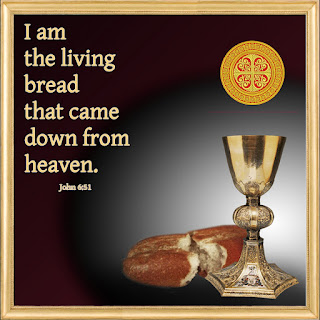Aug 11 Sun
Why is the Lord the living bread that came down from heaven?
Two things are troubling the Jews: the notion that Jesus is bread, and the idea that he came down from heaven.
Regarding Jesus as bread:
We believe it, but those men might have understood Jesus' words metaphorically. They could have interpreted it as him merely bringing them some true gifts from heaven and eternal life. His miracles served as evidence, as he provided mental or physical healing, food for the hungry, wine for joy, and, most importantly, life again after death for a few.
As for him coming down from heaven:
We comprehend this, but the Jews might have seen "from heaven" as him being sent by God, similar to John the Baptist or one of the prophets. They may have believed that he was formed in his mother's womb to be a messenger of God. Once again, Jesus' teachings and miracles served as evidence for them to take this claim seriously. However, their argument was based only on their knowledge of Jesus' human ancestry and relatives. They knew St. Joseph and they knew Our Lady.
In response, Jesus answers, "No one can come to me unless the Father who sent me draws him," and "Everyone who listens to my Father and learns from him comes to me." These words could have been interpreted by them to mean that if they had an issue with Jesus, it was because there was something wrong in their relationship with God the Father.
Jesus in the Eucharist is the Bread of Life that came down from heaven, which we consume to obtain eternal life.
The celebration of the Eucharist in the Mass has been the center of the Church's life since Christ's command to "do this in memory of me."
During the Mass, the priest reenacts Jesus' actions and words from the Last Supper, serving as "the memorial of Christ, his life, death, Resurrection, and intercession in the presence of the Father."
By "memorial," we don't simply mean remembering. The memorial of the Mass is not like a funeral service or a national holiday commemorating an important event.
Instead, the Mass as a memorial means a real participation in the original event. To illustrate, consider how the Last Supper and the Passion of Christ are one event: during the Last Supper, Our Lord offered himself to the Father in a real, sacramental manner, and during his Passion in a real, physical manner. In the Mass, we are participating in that original unique event in a real, sacramental manner.
The Church requires the faithful to participate in the Divine Liturgy on Sundays and feast days and, prepared by the sacrament of Reconciliation, to receive the Eucharist at least once a year, preferably during the Easter season. However, the Church strongly encourages the faithful to receive the Holy Eucharist on Sundays and feast days, or even more frequently, such as daily.
Once one fulfills the minimum requirements, why not strive to do more?
Excerpts from Kevin Aldrich
Video:
